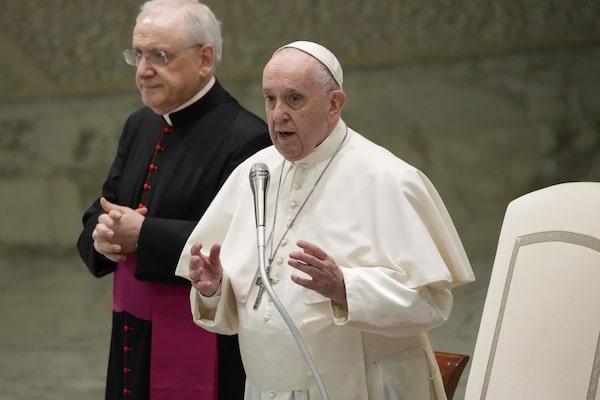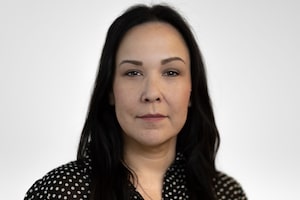
Pope Francis blesses faithful as he starts his weekly general audience in the Paul VI Hall at the Vatican on Nov. 24.Andrew Medichini/The Associated Press
The Assembly of First Nations delegation meeting with Pope Francis next month in Rome will ask him to apologize, on Indigenous land, for the Catholic Church’s role in residential schools when he visits Canada, just one of several topics the group plans to discuss with the pontiff during the one-hour meeting.
”The public view in Canada reaffirmed that a papal apology is absolutely required to advance the human reconciliation,” AFN Regional Chief Norman Yakeleya said Thursday in announcing the members of the delegation.
Mr. Yakeleya said the group also plans to discuss the discovery of unmarked graves at residential-school sites, the Truth and Reconciliation Commission and its 10 guiding principles, the Pope’s highly anticipated visit to Canada and what the future of reconciliation with Indigenous peoples and their relationship with the Catholic Church looks like.
The AFN is one of three Indigenous groups going to the Vatican for a private audience with the Pope between Dec. 17 and 20. The Canadian Conference of Catholic Bishops announced the invitation in June and said the three groups – First Nations, Métis and Inuit – will each meet with Pope Francis in private meetings for one hour. The CCCB is also sending several bishops and is covering the cost of the trip. The delegation includes approximately 30 residential-school survivors, family members and leaders of all three groups.
The Inuit delegation, led by ITK president Natan Obed, is scheduled to meet with Pope Francis on Dec. 17; the Métis Nation, led by president Cassidy Caron, on Dec. 18; and the AFN on the last day, Dec. 20. The entire Indigenous delegation will then have one final audience with the pontiff.
The AFN delegation includes Mr. Yakeleya, who holds the residential-school portfolio; Chief Wilton Littlechild of Ermineskin Cree Nation, representing Alberta; former AFN national chief Phil Fontaine, representing Manitoba; Kukpi7 Chief Rosanne Casimir of Tk’emlúps te Secwépemc First Nation, representing B.C.; Chief Marie-Anne Day Walker-Pelletier of Okanese First Nation, representing Saskatchewan; John Bekale, representing the Northwest Territories; Fred Kelly from the Ojibways of Onigum Nation; Adeline Webber, representing Yukon; Marlene Cloud, representing Ontario; Grand Chief Mandy Gull-Masty of Cree First Nation of Waswanapi, representing Quebec; AFN Youth co-chair Rosalie LaBillois; Marlene Thomas, representing Prince Edward Island; Phyllis Googoo, representing Newfoundland and Nova Scotia; and youth representative Taylor Behn-Tsakoza from Fort Nelson First Nation.
Mr. Fontaine said they have “great expectations,” not just for the meeting but for the work that needs to be done afterward.
“We recognize that the apology is one important matter, but we are also very focused on steps beyond the apology. There’s been discussions around reparations, access to records, unmarked graves, the relationship between the Catholic Church and our community,” he said.
It’s not known yet when and where the papal visit to Canada will take place, but Kukpi7 Chief Casimir said it would be “quite significant” if it were to take place in British Columbia, where ground-penetrating radar found 215 unmarked graves at the former Kamloops Indian Residential School last spring.
The news got the attention of the Pope, who expressed his sympathy but has yet to offer an apology for the Catholic Church’s role in Canada’s residential schools, where it’s estimated thousands of children died in government and church-run institutions. It has been called genocide against Indigenous peoples.
This will be Mr. Fontaine’s second attempt to get an apology from the Vatican, after a private meeting with Pope Benedict in 2009 that he called unsuccessful – though the Pope expressed regret for the abuse inflicted on First Nations children who were sent to residential schools, he said.
“Today, the circumstances are so different,” he said, citing the work that has been done since, including the Truth and Reconciliation Commission’s report, whose calls to action include the need for a formal apology from the Pope to survivors, families and communities for the church’s role in the spiritual, cultural, emotional, sexual and physical abuse in church-run institutions.
“Nothing would be more important than having an apology on our homeland,” Mr. Fontaine said. “We hope that we will have an indication from the Holy Father that when he comes to Canada, he will issue an apology to us here.”
Ms. LaBillois said she plans to speak her truth, something her grandfather, a survivor, wasn’t able to do.
“How we’re severely impacted by this harm and being able to call out to those who were a big part of inflicting that harm against our people,” she said.
Our Morning Update and Evening Update newsletters are written by Globe editors, giving you a concise summary of the day’s most important headlines. Sign up today.
 Willow Fiddler
Willow Fiddler